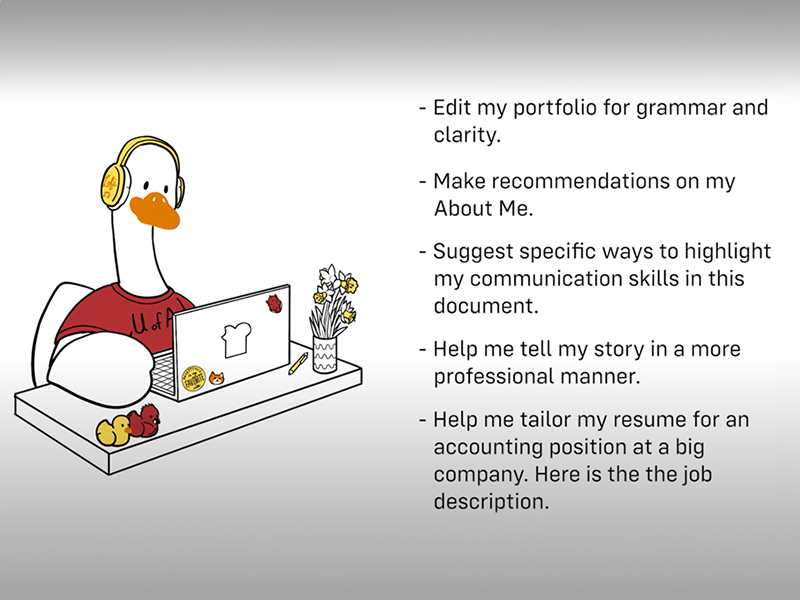
To be competitive in today's workforce, students need to know how to use artificial intelligence (AI) efficiently and ethically. The Work Trend Index Annual Report by Microsoft and LinkedIn indicates that 66% of business leaders will not consider hiring a candidate who does not possess AI skills.
Two faculty members are working hard to equip students with AI skills in career-related courses for Fulbright College Student Success. Angela Williams, teaching assistant professor, teaches Career Connections, a course that teaches students to apply design thinking principles to design and navigate their career and personal lives. It also equips them with strategies to help them stand out in their job or graduate school search. Lynn Meade, teaching assistant professor, teaches Professional ePortfolio, a course where students create a personal website of their college materials designed to be used for career advancement. Both teachers are early adopters of using AI in the classroom and continue to help students be relevant and equipped.
Meade said she attended Teaching Camp and heard Jose Bowen speak on his upcoming book, Teaching with AI and had taken the Auburn AI training course to begin to understand the implications of AI, but the thing that persuaded her to go all in was when she overheard a conversation.
"I heard a major employer say that they were looking for students who knew how to leverage AI, but they had trouble finding them. At that moment, I realized that I was not adequately equipping my students and that I needed to move from simply allowing my students to use AI to teach them how to use it effectively."
Meade suggests that using AI is a good complement to her course because it not only allows students to refine their writing and improve their ePortfolios, but it also gives them skills they can add to their technology page.
Williams decided to use AI in her Career Connections courses because, if used effectively, it can help students enhance their resumes, cover letters, and personal statements and give them a competitive advantage among multiple job or graduate school applicants. According to Williams, "AI tools can offer significant benefits, giving students the confidence to improve the quality and relevance of their documents. By analyzing job descriptions and suggesting keywords and phrases that align with the skills and qualifications required for the position, students can create documents that stand out to recruiters and navigate Applicant Tracking Systems, which many companies use to screen applications."
Kyle Young, a senior communication major has taken both the Career Connections and Professional ePortfolio courses and said, "These courses emphasized the role of AI and its benefits for students. When I had an opportunity to meet a senior executive within a fortune 500 tech company, they highlighted the growing importance of AI and how companies are increasingly seeking individuals with AI experience. Because I knew AI prompt generation, they wanted my contact information, and I established a lasting connection with potential opportunities within the company itself."
Williams and Meade teach students that AI can help refine career documents and help them stand out by being AI proficient. With the help of the Global Campus team and Amy Cooper's animation talents, Meade created an animated video titled "How to Do AI Prompt Engineering to Revise Your Writing" for use in both online and on-campus Career Courses.
Meade and Williams' Suggestions
- Use AI Ethically: Ethical use of AI involves making sure your documents truthfully represent your abilities and experiences. It's important to avoid inventing or embellishing qualifications or experiences. AI should be used to highlight your genuine strengths and skills not to fabricate a misleading story.
- Start With Your Own Input: Start with your own drafts of the document, and then use an AI tool to get suggestions for enhancements. Always remember to add a personal touch to ensure the content reflects your unique voice and experiences.
- For Best Results, Give AI the Details: Always tell the AI who you are, what you are doing, and what you want. "I am a college student, making a cover letter to apply for a marketing job, help me fine tune this draft," or "I am a senior biology major, applying to graduate school, help me fine tune my application letter to fit this criterion."
- Sound Authentic: Your career documents should sound like you, not something a machine wrote. Use AI to improve clarity and impact, but always ensure the tone remains authentic and personable.
Pillar one of the University of Arkansas 150 Forward program promises to "create opportunities for every student to define and attain their individual career or post-graduate pathway." By understanding how to effectively and ethically utilize AI tools, students can significantly enhance their career materials, gain valuable technology skills, and increase their chances of success in today's competitive job market.
Students should always check the syllabi concerning AI use in individual classes. For more information about University of Arkansas policies and suggestions regarding Artificial Intelligence check out What is Generative AI? by Teaching Innovation and Pedagogical Support and Academic Initiatives and Integrity by Academic Initiatives and Integrity.
Topics
Contacts
Lynn Meade, teaching assistant professor
Fulbright College Student Success
479-575-5960, lmeade@uark.edu
Andra Parrish Liwag, executive director of strategic communications
Fulbright College of Arts and Sciences
479-575-4393, liwag@uark.edu